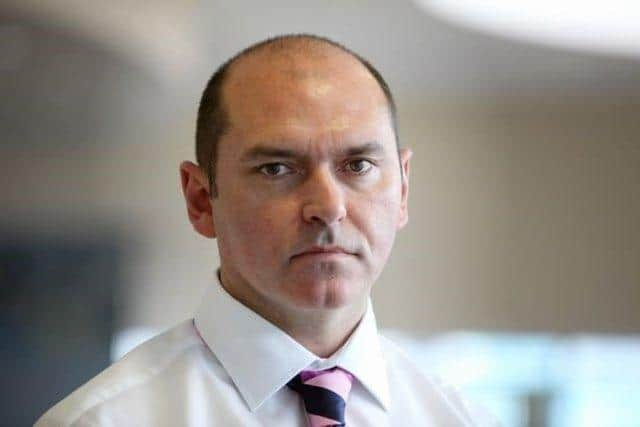Northumberland health boss tells of ‘genuine, palpable fear’ among staff at beginning of coronavirus outbreak
and live on Freeview channel 276
There was ‘genuine, palpable fear’ among staff at the beginning of the coronavirus outbreak, Northumberland’s hospitals boss has said.
But Sir James Mackey, chief executive of Northumbria Healthcare NHS Foundation Trust, was full of praise for the response to the pandemic and the efforts of all of the different parts of the county’s healthcare system.
Advertisement
Hide AdAdvertisement
Hide Ad“One of the really positive things has been the extent of collaboration,” he said.


Sir James, who also had a two-year stint heading up NHS Improvement, was speaking as the trust, which runs the hospitals in Northumberland and North Tyneside, held its latest board meeting on Thursday, May 28.
He explained it would be some time before actual performance could be assessed.
“There’s now understandably much commentary on how successful this has been in terms of outcomes for patients, but the reality is we’re going to have to wait a long time before the data can really be analysed in a realistic way across the NHS and internationally to see how we have done,” he said.
Advertisement
Hide AdAdvertisement
Hide Ad“The important thing is to see what we can learn from what’s happened, but there’s massive inconsistencies in international comparisons, there’s even inconsistencies across the UK nations.
“Right throughout, we have been keeping track of what’s going on from our perspective and whether we can learn from colleagues around the country or local partners.”
The risk of cases spiraling
Since the start of the lockdown, the trust has had 16,000 admissions, but only 613 were Covid-positive, which provides some perspective, however, Sir James added: “Everyone has been very aware that if we don’t manage that properly, that 613 can quickly become 10,000.”
He said that the number of deaths from those 613 admissions – 185 when the meeting was held – was quite ‘a good success rate’ when looking at what was happening elsewhere.
Advertisement
Hide AdAdvertisement
Hide Ad“There’s an understandable focus on death, but we also need to focus on the very many patients who have had the disease and recovered and got back to normal life,” he added.
Sir James opened by referring to the performance dashboard which is covered at every board meeting, saying: “We went into the Covid process in very, very good shape, delivering on all of our key metrics, a very strong overall performance, fantastic patient and staff experience, very strong financially and a really powerful focus on quality.
“The scorecard today and the rest of the agenda show that we are now trying to get onto other things other than Covid, but it’s a work in progress.
“It’s going to be quite a difficult process over the next couple of months, maintaining focus on safety and the Covid issue while also recognising that we have other things to do.”
Advertisement
Hide AdAdvertisement
Hide AdHe reminded the meeting of the goals when the coronavirus crisis started, given some of the ‘confusion’ since.
“It’s such a long time ago, so much has changed, that it’s easy to forget the original issue for all of us was to prevent health services from being overrun, which is usually the main priority in this kind of pandemic,” he said. “There was really widespread concern as to what had happened in China and more specifically Italy.”
‘Dunkirk spirit’
Sir James highlighted that unlike many other trusts, this didn’t mean that nothing else has been going on in Northumberland’s hospitals.
“From our very local perspective, we took the decision very early on that we wanted to maintain as much essential access as possible, so as well as being ready and available for Covid-positive patients, we wanted to still see and treat cancer patients,” he said. “Also if people had other time-sensitive needs – urgent operations – to try to continue with that as best we can, and we’ve managed to do that.”
Advertisement
Hide AdAdvertisement
Hide AdThe pandemic sparked a major increase in the use of technology, he explained, both in hospitals and with primary-care colleagues (GPs etc). “We probably moved about five years in the space of about a week,” he said.
He also highlighted the ‘Dunkirk spirit’ early on in relation to the major infrastructure operation that took place to ensure the organisation was ready for what was to come.
Sir James admitted that there was ‘genuine, palpable fear’ across the trust at the outset based on the predictions, given that the ‘original (Imperial) model suggested half-a-million deaths in the UK’.
“We’ve sadly lost a lot of people across the UK during this process, but it’s nowhere near half-a-million, because of the actions that have been taken,” he said.